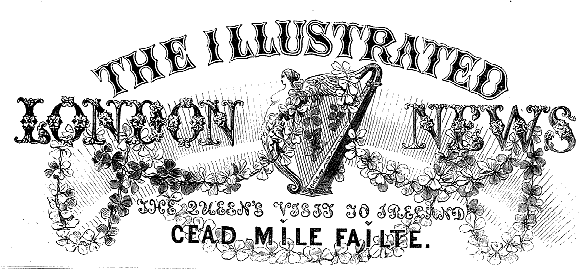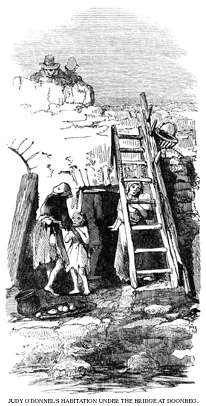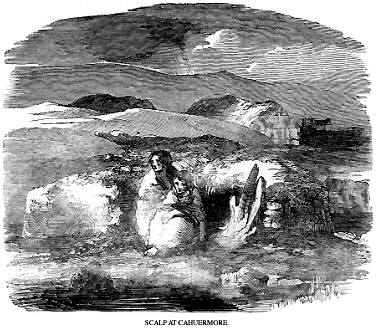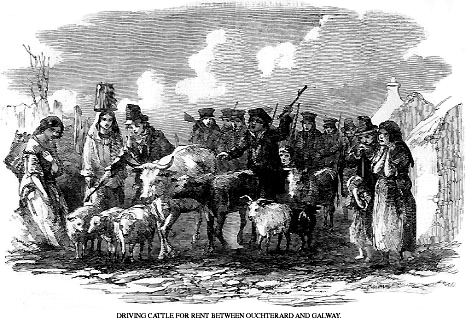
| THE ILLUSTRATED LONDON NEWS. |
[Dec. 29, 1849. |
![]()
CONDITION OF IRELAND:
ILLUSTRATIONS OF THE NEW POOR-LAW
From the town of Kilrush to Kilkee, on the shore of the Atlantic, I passed through an unimproved district, on which nature has bestowed fertility, and man has levelled the habitations that were built in happier days. In a drive of seven miles I counted thirty-three roofless houses. Kilkee is a beautiful spot. Round a bay, from which the ground rises like an amphitheatre, are planted many villas and baths. The scenery is bold, and the waves, after rolling across the vast Atlantic, spend their last force on the rocks, dying amidst noise and foam. From its situation, it is worthy of its name, the "Western Brighton," and it is worthy of notice, showing that nature has left nothing that can contribute to prosperity, not even a suitable bathing-place, unprovided in the Union of Kilrush. From Kilkee, through Kilard and Donoughboy, I went to Moveen the roofless, of which I have already sent you a Sketch. I was told here a melancholy tale of the widow Hogan and her four children, who were all carried out of her cabin in a helpless state of fever, and laid down in a ditch on the opposite side of the road, where they remained several days, when a humane stranger had them carried to the hospital, eleven miles off. To Tullig from Kilkee, I counted ninety-two roofless houses. Passing afterwards through the picturesque village of Cariegaholt to Donagha and Querin, I counted 105 dwellings in ruins. Clarefield, to which I came next, baffles description. Adults, who appeared idiotic; children, wrinkled with care, so that they appeared like aged persons; and men who should not be worn out, but more helpless than children, with scarcely a rag to cover them, crowded the place. Their habitations were mere kennels. I was heart-sick, and said "Surely there cannot be so much suffering and neglect in any other spot on the face of the earth!" I returned to Kilrush, glad to find a refuge even in it from the more appalling misery of the surrounding villages.
Leaving Kilrush once more, I proceeded northwards to Enaghmonmore, Derryard, and Donmore, and in this distance I counted thirty houses levelled. In the whole district there is not one respectable or even decent house. Kilard, to which I next came, is another ruined village, in which the extirpation of the old Irelanders has been complete. Afterwards I passed through the village of Doonbeg, a spot possessing every natural advantage, one half of which has been destroyed by the landowners, and remains, with its pointed gables and a few blackened rafters, a sad contrast even to the miserable houses that are left standing. The people who are yet left alive are crowded into dens, or rather dog-holes, where, in a space not sufficient for two persons, twenty are glad to find shelter.
 Two wretched
families have taken refuge under the bridge in a hole. They consist of two
widows, one with three children, all ill of jaundice, and the other with five.
The history of Judy O'Donnel, one of the widows, is worthy of being sketched.
She had given evidence against a dishonest relieving officer whose relative was
a driver upon the estate on which she lived, and Judy's house was very soon
afterwards levelled with the ground. The wreckers came upon it in her absence,
when her son gallantly defended his home. He mounted on the roof with a bag of
stones, and kept the enemy at bay till his ammunition was exhausted, when he was
obliged to give in, and stand by to see the little furniture of this mother cast
into the road and the house pulled down. Judy exhibited her receipts for the
rent up to the last gale; and she declared the agent of the owner, to whom she
had tendered what was due twice, had refused, and that she was ejected because
she deposed against the dishonest public servant. Judy and Margaret O'Donnel,
with their families, then retired to the hole under the bridge, represented in
the sketch, and there they are now suffered to remain, holding their habitation
at the mercy of the county surveyor. They are afraid of being ejected even from
this spot, and dare not cross the stepping-stones shown in the Sketch lest they
should be taken up for trespassing. Judy O'Donnel's son is dying of dysentery.
Two wretched
families have taken refuge under the bridge in a hole. They consist of two
widows, one with three children, all ill of jaundice, and the other with five.
The history of Judy O'Donnel, one of the widows, is worthy of being sketched.
She had given evidence against a dishonest relieving officer whose relative was
a driver upon the estate on which she lived, and Judy's house was very soon
afterwards levelled with the ground. The wreckers came upon it in her absence,
when her son gallantly defended his home. He mounted on the roof with a bag of
stones, and kept the enemy at bay till his ammunition was exhausted, when he was
obliged to give in, and stand by to see the little furniture of this mother cast
into the road and the house pulled down. Judy exhibited her receipts for the
rent up to the last gale; and she declared the agent of the owner, to whom she
had tendered what was due twice, had refused, and that she was ejected because
she deposed against the dishonest public servant. Judy and Margaret O'Donnel,
with their families, then retired to the hole under the bridge, represented in
the sketch, and there they are now suffered to remain, holding their habitation
at the mercy of the county surveyor. They are afraid of being ejected even from
this spot, and dare not cross the stepping-stones shown in the Sketch lest they
should be taken up for trespassing. Judy O'Donnel's son is dying of dysentery.
Before quitting Kilrush altogether, I must give you some further particulars of the Union and of its inhabitants. I must first tell you that at present the population of the Union is decreased from 82,358 in 1841 to 65,000; and, as 31,549 persons were receiving relief in June, actually 48 per cent. of the inhabitants are paupers, and such paupers as the veriest paupers in England would hasten to relieve. What has become of the 17,358 who, contrary to the course of nature, which everywhere delights in the increase of sentient beings, unlike warriors and Irish landlords, and has provided for the continual ennobling of all, I cannot precisely say. Some few, a very small fragment, may, by emigration, have escaped from the desolation, and found a refuge in England, or a happier home across the Atlantic; but the great majority has been starved out of existence.
"I see," said Captain Kennedy, writing on January 2, this year, in the papers published by the House of Commons, "masses of the people starving, and the land, which could be made to feed treble the number, lying all but waste." In the special returns I find entries like this:-- "This man, Michael Considine, in consequence of having land, could not be relieved. His wife and nine children died of actual want." The following table of deaths in the workhouse will throw some light on this painful subject:--
1847, 1848, AND ELEVEN MONTHS OF 1849.
|
Years. |
Avg. # of Inhab- itants. |
Total Deaths. |
After Three Months. |
After Two Months. |
After One Month. |
After One Week. |
After Odd Days. |
|
1847 |
922 |
1075 |
321 |
235 |
264 |
154 |
101 |
Thus, the whole number of deaths in the workhouse, in 1847, exceeded the average number of inmates by 43. It was only less than the largest number ever present (1192) by 117. In 1847, the paupers entered the workhouse only to die. In 1848, the case was not quite so bad; the deaths were 202 less than the average number present in the workhouse, and 469 less than the largest number (1678) ever present. In 1849, the mortality was much lessened, partly owing to a change in the management, under vice-guardians, who had superseded elective guardians, and partly owing to the vast number of previous deaths, which left, in 1849, fewer to die. Of all the frightful mortality I ever heard of, except that of the Black-Hose of Calcutta, or that of the fore-cabin of the Londonderry steamer, that of the Kilrush Union workhouse is the most frightful. Nor was there, according to the theory of Mr. Doubleday (who asserts that births are in proportion to want and misery), any increase of children to compensate. In the half-year ending March 25, 1849, there was not a single birth in the Kilrush Union; in that ending September 25, there were only four; while the average number of inmates was 2200. Neither pestilence nor war can cause depopulation like a short crop, combined with the evictions dictated by a false theory, and the belief that, under the direction of legislation, the evicted people will be benevolently provided for in a union workhouse.
The area of the Union is 178,935 acres; and in 1841, therefore, the population was in the proportion of one soul to every 2-1/2 acres, or far below the poet's standard of every rood of ground maintaining its man, and far below the proportion of population to acres in Lancashire. The area of that shire, according to Mr. McCulloch-- for high authorities differ on such a matter of geometrical measurement-- is 1,130,240 acres, and its population, in 1841, was 1,667,054; or, there was then 1-1/2 souls to every acre; since then the population has, no doubt, increased at least in as large a proportion as the less dense population of Kilrush has been destroyed. May I mention this contrast as some elucidation of the great question at issue i the world, as to the effects of commerce and manufactures united with agriculture, and of agriculture alone, in sustaining a population. In proportion to Lancashire, Kilrush-- which consists for the most part of a very fertile soil; which is admirably situated at the mouth of a great river, possessing also a large extent of sea-coast, in the neighbourhood of an abundance of fish; whose people are actually starved out of existence-- was, before the depopulation began, only one-third as densely peopled as Lancashire. The valuation of the Kilrush Union is put down at £59,449, or something more than 6s. 2d. per acre. The annual value of real property in Lancashire is put down in 1841 at £5,266,606, or upwards of £4 13s. per acre. Thus, while the population of Lancashire, per acre, is three times as great as that of Kilrush, the value of property is thirteen times as great. These little data, applicable in a great degree to the whole of agricultural Ireland, may serve to explain the different effects of commerce and manufactures as contrasted with agriculture, and the different operation of a Poor-law falling on the rapidly increasing property of commercial and prosperous England and on the poverty of agricultural and decaying Ireland.
It is not my object, nor can it be yours, nor that of any reflecting man, to hold up the unfortunate landowners of this district to public indignation. They are the heirs and the victims of a vicious system. I have forborne, therefore, to mention their names in conjunction with the unfortunate creatures whose cases I have brought before you. I will, however, before I quit the subject altogether, mention that the principal proprietors and middlemen of the Union are Colonel Vandeleur, O'Gorman Mahon, John McDonnel, the Marquis of Conyngham; Messrs. Westropp, John McMahon, Blackall, Major Brooks, Charles Wilmot Smith, Hugh P. Hickman, H. Stewart Burton, Mr. Westly, and Messrs. Stackpooles, minors. I may also give you the following account of the houses levelled within the Union of Kilrush, in the last two years:-- Kilmurry Strikane, 604; Kilard, 621; Moyarta, 402; Kilrush, 305; Knock and Kilmer, 111; Kilmichael, 221; Kilmacdooane, 167; Kilballyowen, 150; Kilkee, 165; Kildysart, 80; Kilfidane, 40; Kilofin, 30: Total, 2891.
 I must now take
leave of Kilrush, which I left on my way to Ennistimon. Similar scenes of
desolation to those I had beheld for several days continued; and on both sides
of the road, as far as the eye could reach, it fell on "tumbled" and
roofless houses. Now and then I saw on the borders of a bog or quagmire some of
the scalps in which the people seek to preserve their lives. On arriving at the
bog of Cahuermore, I alighted at the scalp shown in the Sketch, which Mr. Monsel
and his companions discovered to their surprise, and found in it a woman dying
of the customary fever which attends on want of food and clothing and the
ordinary necessaries of life. Than this scalp, nothing could be more wretched.
It was placed in a hole, surrounded by pools, and three sides of the scalp
(shown in the Sketch) were dripping with water, which ran in small streams over
the floor and out by the entrance. Yet, wretched as this hole is, the poor
inhabitants said they would be thankful and content if the landlord would leave
them there, and the Almighty would spare their lives. Its principal tenant is
Margaret Vaughan, whose history has found its way before the public, and a more
wretched history, even in this country of wretchedness, is scarcely to be found.
Not far from her cave is the destroyed village of Kilmurry Strikane, another of
those pictures of desolation of which I have already sent you too many. For the
present I will leave them, and turn to a little oasis of humanity in the desert
of misery.
I must now take
leave of Kilrush, which I left on my way to Ennistimon. Similar scenes of
desolation to those I had beheld for several days continued; and on both sides
of the road, as far as the eye could reach, it fell on "tumbled" and
roofless houses. Now and then I saw on the borders of a bog or quagmire some of
the scalps in which the people seek to preserve their lives. On arriving at the
bog of Cahuermore, I alighted at the scalp shown in the Sketch, which Mr. Monsel
and his companions discovered to their surprise, and found in it a woman dying
of the customary fever which attends on want of food and clothing and the
ordinary necessaries of life. Than this scalp, nothing could be more wretched.
It was placed in a hole, surrounded by pools, and three sides of the scalp
(shown in the Sketch) were dripping with water, which ran in small streams over
the floor and out by the entrance. Yet, wretched as this hole is, the poor
inhabitants said they would be thankful and content if the landlord would leave
them there, and the Almighty would spare their lives. Its principal tenant is
Margaret Vaughan, whose history has found its way before the public, and a more
wretched history, even in this country of wretchedness, is scarcely to be found.
Not far from her cave is the destroyed village of Kilmurry Strikane, another of
those pictures of desolation of which I have already sent you too many. For the
present I will leave them, and turn to a little oasis of humanity in the desert
of misery.
A short drive from Kilmurry brought us to the summit of a hill where the face of the country appeared instantly to have changed. It was like passing from the Catholic to the Protestant cantons of Switzerland, or rather like a dream. At once I came on neat white-washed houses and tidy gardens, with the haggard or farm-yard enclosed, and generally containing something worth taking care of. I had entered on the domain of Colonel Windham, who is not tired of his fellow-creatures, and does not seek to exterminate them. Not a roofless house did I see here. Whether Colonel Windham have spent a large fortune on this place, or whether he have gained money while he has promoted the happiness of his tenantry, I am not informed; but when he contrasts his property with the surrounding estates, he must feel himself a proud and a happy, if not a rich, man. The whole face of the country is altered, and all the people you meet, whether men, women, or children, seem cheerful, as if they had plenty of the means of subsistence. On the very threshold of his property stands a national school, equally picturesque from its position, and admirable for its management. Though a single example is by no means conclusive of what might be equally done by all, and there never can be any just reliance on a system which places the welfare of the many at the discretion of a few, and wrecks the happiness of a whole community when the hereditary owner of a large property is a worthless extortioner and spendthrift, yet I must say the conduct of Colonel Windham adds to the loathing with which we regard many of his neighbours. More fortunate, however, than many of them, he inherited an unencumbered property and an ample fortune in England, which enabled him to spare his Irish tenants without falling prey to exacting creditors, when the famine fell on the land.
On coming to Spanish Point, so named from a portion of the Armada having been wrecked on it, I found an enormous building, once called the Atlantic Hotel, converted in to an auxiliary union workhouse. It is an emblem of what is everywhere going on-- the change from productive industry, to destructive pauperism, the cessation of hope and enterprize, and the spreading of apathy and despair. I love the ocean with its incessant life, a great emblem of eternity, and I found the scenery on its shores, about Spanish Point, bold and attractive. From thence, however, to Ennistimon, through Lohyncha, there is nothing so remarkable as the absence of those roofless villages and skeleton houses I had found so abundant in the districts about Kilrush.
I send you herewith a Sketch of Driving for Rent. It may serve to vary a
little the miseries I have to portray.

![]()